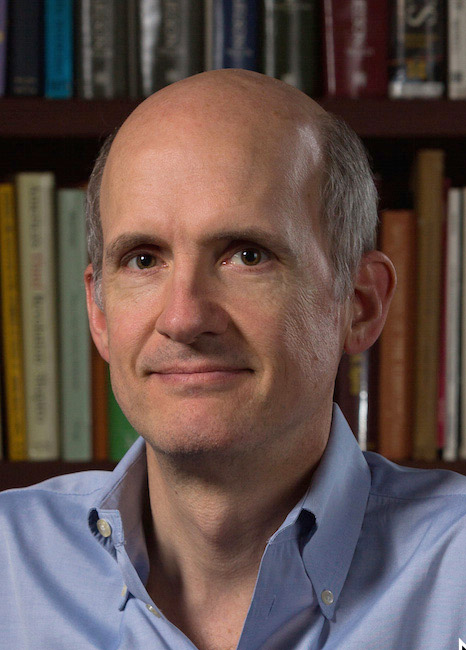News
American Academy of Arts & Sciences Elects Michael Hasselmo
CAS neuroscientist known for pioneering research—and building community

Michael Hasselmo combines experiments and computational modeling to study how memory works in the brain. Photo (left) by Michael Spencer Photography.
Michael Hasselmo, a College of Arts & Sciences professor of psychological and brain sciences, who is known for his pioneering research into memory as well as for his leadership in bringing together neuroscientists from multiple disciplines, has been elected to the American Academy of Arts & Sciences.
“It’s a great honor to be part of this community,” says Hasselmo, director of BU’s Center for Systems Neuroscience (CSN). “It’s a society that brings together all different disciplines. You tend to deal mostly with people in your field, and it’s good to be reminded of the broader scope of the world, not just academic, but also in the arts, and even in politics.”
Also, says Hasselmo, “I would love to meet Barack Obama.” The former American president has also been named to the the academy’s Class of 2018.
In addition to Obama, among the academy’s 213 new members, who were elected in 25 categories and are affiliated with 125 institutions, are author Ta-Nehisi Coates, Netflix, Inc., CEO W. Reed Hastings, Jr., actor Tom Hanks, and Supreme Court Justice Sonia M. Sotomayor. The new members will be formally inducted at a ceremony at the academy in October.
“Membership in the American Academy is wonderful recognition of Michael’s outstanding accomplishments as a scientist and academic leader,” says Robert A. Brown, BU president, himself a member of the academy.
“Mike is an exceptional neuroscientist who is known for using a range of experimental methods, including neurophysiological and behavioral experiments and computational modeling, to understand the cortical mechanism for memory-guided behavior,” says Gloria Waters, vice president and associate provost for research.
“It’s one thing to perform an experiment and describe the results,” says John White, a College of Engineering professor of biomedical engineering. “Mike goes further, building a computational framework to describe a wide variety of results and predict outcomes of new experiments. He is far ahead of the field in this regard.”
Hasselmo has used these methods to describe how the dynamics of brain circuits and certain chemicals in the brain—such as acetylcholine—enhance the encoding of memory and guide behavior. He focuses on the entorhinal cortex and hippocampus, and his work is relevant to how memory and cognitive function are impaired in Alzheimer’s disease and schizophrenia. He has published papers modeling cognitive deficits in both disorders based on neural circuit models.
“His work on the neuromodulatory and oscillatory dynamics of memory is groundbreaking,” says academy member Earl Miller, the Picower Professor of Neuroscience at MIT, who has collaborated with Hasselmo.
Hasselmo learned about the honor last Tuesday, when Kevin Gonzales, Rajen Kilachand Center for Integrated Life Sciences & Engineering (CILSE) director of operations, told him he had a FedEx delivery downstairs. “I thought it was just supplies,” Hasselmo says.
As soon as he read the letter inside, he emailed his wife, Chantal Stern, a CAS professor of psychological and brain sciences and director of the Cognitive Neuorimaging Center. Stern texted their two grown children with the news, and Hasselmo sent a text to his 86-year-old father, Nils Hasselmo, the former president of the University of Minnesota and of the Association of American Universities.
Hasselmo is the principal investigator on two National Institutes of Health R01 grants to study memory mechanisms involving modulation and oscillatory dynamics in entorhinal cortex and other cortical structures in the brain.
He is also the principal investigator on a five-year, $7.5 million Office of Naval Research (ONR) grant to study how the brain mechanisms for learning of rules work and how this might be translated into computer programs, especially for autonomous systems. The grant was awarded as part of the ONR’s Multidisciplinary University Research Initiative program, which supports team research involving more than one traditional scientific discipline.
Team research involving multiple disciplines is a trademark of Hasselmo’s work in the lab as well as his teaching. He founded the CSN, and in 2014, he started its popular lunchtime seminars, which feature speakers from other BU departments, such as biomedical engineering, math, physics, pharmacology and experimental therapeutics, and neurology, as well as from other institutions across the country and around the world. The seminars, usually held from 10 to 20 times a year, are open to all and routinely draw 80 to 100 people. So important have they become to BU’s neuroscience community that the architects of CILSE designed the first floor colloquium room to accommodate them.
Hasselmo, who plays keyboards in a rock band with Miller and other scientists, is known as a generous mentor and has helped guide 17 of his former graduate students—and postdoctoral fellows—to positions as faculty researchers at universities across the United States and in Canada. “I would not be where I am today without Mike’s mentorship,” Lisa Giocomo (CAS’04, GRS’08), a Stanford University assistant professor of neurobiology, wrote in an email. “He taught me to work successfully across a wide range of disciplines. His enthusiasm for science was an inspiration.”
On a shelf behind Hasselmo’s desk is a drawing of a mouse by Giocomo. In her email, she recalled the day she made her first neural recording of a mouse, in Hasselmo’s lab. “It was probably just one recording among the thousands Mike had performed—or seen—but he came in with such excitement to watch the recording on my rig, as if it was the very first.”
Hasselmo, who grew up in Golden Valley, Minn., graduated from Harvard College with a special concentration in behavioral neuroscience. He started out as a linguistics major looking for a way to combine his multiple interests—in language and the brain, physics, and philosophy. “I remember reasoning this through as an undergraduate,” he says. “I wanted to be able to understand everything about the world in a reductionist, mathematically structured way. I was also interested in philosophical questions about how we think and the basis for our consciousness of the world.
“So I thought, how can I link those questions?” The answer, he decided, was neuroscience. As a linguistics major, “I wanted to understand how neurons in the brain could perform language function. Then I realized there wasn’t any knowledge about that, really, and there still isn’t, because that was difficult to study in real neural circuits. So I thought, I can study memory—that’s a cognitive function. You can study it in neural circuits. It’s not only present in humans.”
Hasselmo studied at Oxford University on a Rhodes scholarship, earning a PhD in experimental psychology in 1988, and meeting Stern, who was also at Oxford. He completed a postdoctoral fellowship at the California Institute of Technology in 1991 and was an Harvard assistant and associate professor of psychology from 1991 to 1998.
In the late 1990s, Hasselmo and Stern came to BU, in part because they wanted to work with the late Howard Eichenbaum, a William Fairfield Warren Distinguished Professor and a CAS professor of psychological and brain sciences. Eichenbaum, who died suddenly in July 2017, was elected to the academy in 2015.
Hasselmo has published more than 120 articles in peer-reviewed journals. He is a member of the Board of Reviewing Editors of Science and is the computational neuroscience editor at Hippocampus.
In addition to Brown and Eichenbaum, current academy members from BU include President Emeritus Aram Chobanian (Hon.’06); Virginia Sapiro, a CAS political science professor; Leonid Levin, a CAS computer science professor; William Fairfield Warren Distinguished Professors Nancy Kopell, Laurence Kotlikoff, and Robert Pinsky; Kathryn Bard, a CAS archaeology professor; Jeffrey Henderson, William Goodwin Aurelio Professor of Greek Language and Literature; Nobel Laureate Sheldon Glashow, Arthur G. B. Metcalf Professor of Mathematics and Science; Ha Jin (GRS’93), a CAS creative writing professor; and Paula Fredriksen, a CAS professor emerita.
Founded in 1780, the American Academy of Arts & Sciences honors exceptional scholars, leaders, artists, and innovators and engages them in sharing knowledge and addressing global problems. Past members include Benjamin Franklin, Alexander Hamilton, Ralph Waldo Emerson, Margaret Mead, and Martin Luther King, Jr. (GRS’55, Hon.’59).
Author, Sara Rimer can be reached at srimer@bu.edu.
Brighter Prospects? New Views on the Global Economy
 BU IN DC
BU IN DC
Brighter Prospects? New Views on the Global Economy
The BU Global Development Policy Center hosted a Washington discussion with Jin Liqun of the Asian Infrastructure Investment Bank and José Antonio Ocampo of the Central Bank of Colombia on April 18.
See the pictures
 RESEARCH HIGHLIGHT
RESEARCH HIGHLIGHT
Smaller, Faster, Cheaper
BU engineer Cathie Klapperich empowers both doctors and patients with point-of-care diagnostics: simple, portable technologies to diagnose diseases like malaria or HIV.
Learn how they work
 FACULTY EXPERT
FACULTY EXPERT
TV Behemoth Raises Concerns
BU College of Communication's John Carroll explains why he is wary of Sinclair Broadcast Group's practices and its proposed merger with Tribune Media. Find out why
IN CASE YOU MISSED IT...
Julie Palmer of the BU School of Public Health explains the health disparities facing African American mothers in The New York Times... Patrick Kinney of the BU School of Public Health describes how cities are addressing climate change forWBUR... Ann McKee of the School of Medicine and alumna Carmen Yulín Cruz, mayor of San Juan, Puerto Rico, were named to Time's 100 most influential people list... The Washington Post says that it's true you are as old as you feel, according to research from BU School of Public Health biostatician Paola Sebastiani.
Diversity in Science – Where I’m Coming From
Underrepresented voices in science offer unique perspectives

Photo above provided by Jackie Ricciardi.
SCIENCE, WHICH IS SUPPOSED TO INVESTIGATE the entirety of the physical and natural world, is missing something. So is engineering. According to a report issued last year by the National Science Foundation (NSF), blacks and Hispanics are underrepresented both as recipients of degrees in science and engineering and in the science and engineering workforce. The same NSF report found that while women have reached parity with men among science and engineering degree recipients, they make up disproportionately smaller percentages of employed scientists and engineers than they do of the US population, and that while people with disabilities are as likely as others to enroll in science and engineering studies, they also remain underrepresented in the workforce. That imbalance is a problem for those underrepresented groups, and many observers consider it a problem for science and engineering, two life-changing fields that lack the benefit of the wealth of perspectives shared by the country’s increasingly diverse population.
Hear their stories on BU Today.







 BU IN DC
BU IN DC NOTABLE ALUMNI
NOTABLE ALUMNI FACULTY EXPERT
FACULTY EXPERT